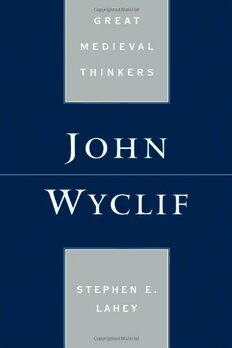Download John Wyclif PDF Free - Full Version
Download John Wyclif by Stephen Edmund Lahey in PDF format completely FREE. No registration required, no payment needed. Get instant access to this valuable resource on PDFdrive.to!
About John Wyclif
John Wyclif (d.1384) has too frequently been described as ''Morning Star of the Reformation'' and only recently begun to be studied as a fourteenth-century English philosopher and theologian. This work draws on recent scholarship situating Wyclif in his fourteenth-century milieu to present a survey of his thought and writings as a coherent theological position arising from Oxford's ''Golden Age'' of theology. Lahey argues that many of Wyclif's best known critiques of the fourteenth-century Church arise from his philosophical commitment to an Augustinian realism evocative of the thought of Robert Grosseteste and Anselm of Canterbury. This realism is comprehensible in terms of Wyclif's sustained focus on semantics and the properties of terms and propositions, a ''linguistic turn'' characterizing post-Ockham philosophical theology. Arising from this propositional realism is a strong emphasis on the place of Scripture in both formal and applied theology, which was the starting point for many of Wyclif's quarrels with the ecclesiastical status quo in late fourteenth-century England. This survey takes into account both Wyclif's earlier, philosophical works and his later works, including sermons and Scripture commentary. Wyclif's belief that Scripture is the eternal and perfect divine word, the paradigm of human discourse and the definitive embodiment of truth in creation is central to an understanding of the ties he believes relate theoretical and practical philosophy to theology. This connection links Wyclif's interest in the propositional structure of reality to his realism, his hermeneutic program, and to his agenda for reform of the Church. Lahey's survey also highlights Wyclif's rejection of Bradwardine's determinism in favor of a model of human freedom in light of God's perfect foreknowledge, and also explores the relation of Wyclif's spatiotemporal atomism to his rejection of transubstantiation. This is the first book-length, comprehensive survey of Wyclif's thought, and will be of interest to students of later medieval theology, philosophy, history, and literature.
Detailed Information
| Author: | Stephen Edmund Lahey |
|---|---|
| Publication Year: | 2008 |
| ISBN: | 9780195183320 |
| Pages: | 305 |
| Language: | English |
| File Size: | 1.008 |
| Format: | |
| Price: | FREE |
Safe & Secure Download - No registration required
Why Choose PDFdrive for Your Free John Wyclif Download?
- 100% Free: No hidden fees or subscriptions required for one book every day.
- No Registration: Immediate access is available without creating accounts for one book every day.
- Safe and Secure: Clean downloads without malware or viruses
- Multiple Formats: PDF, MOBI, Mpub,... optimized for all devices
- Educational Resource: Supporting knowledge sharing and learning
Frequently Asked Questions
Is it really free to download John Wyclif PDF?
Yes, on https://PDFdrive.to you can download John Wyclif by Stephen Edmund Lahey completely free. We don't require any payment, subscription, or registration to access this PDF file. For 3 books every day.
How can I read John Wyclif on my mobile device?
After downloading John Wyclif PDF, you can open it with any PDF reader app on your phone or tablet. We recommend using Adobe Acrobat Reader, Apple Books, or Google Play Books for the best reading experience.
Is this the full version of John Wyclif?
Yes, this is the complete PDF version of John Wyclif by Stephen Edmund Lahey. You will be able to read the entire content as in the printed version without missing any pages.
Is it legal to download John Wyclif PDF for free?
https://PDFdrive.to provides links to free educational resources available online. We do not store any files on our servers. Please be aware of copyright laws in your country before downloading.
The materials shared are intended for research, educational, and personal use in accordance with fair use principles.

